Professor Emerita Sharon Lawler: Reflections on 28-Year Career
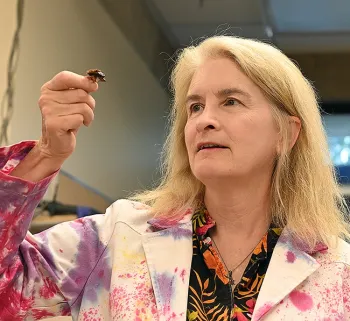
That's how colleagues and students describe the life and legacy of Professor Emerita Sharon Lawler, an aquatic entomologist who retired in January 2023 after a 28-year career with the UC Davis Department of Entomology and Nematology.
If you attended the annual UC Davis Picnic Day celebrations, you knew her as “the aquatic insect expert.” In her “Little Swimmers” display, she showcased aquatic biodiversity and encouraged questions on everything from tadpoles to giant water bugs mosquito larvae.
Now in her new role as professor emerita, Lawler continues to focus on preserving aquatic biodiversity. "I'm mentoring and doing research," she says.
“Sharon always put the needs of students first,” said longtime colleague, UC Distinguished Professor Richard “Rick” Karban, a community ecologist in the Department of Entomology and Nematology. “She was focused on what they needed from her rather than the other way around. In the department, she did more than her fair share of student-centric tasks. She was committed to accommodating and including the diverse circumstances of students before that was on many people's radars. Co-teaching community ecology with Sharon for 28 years, I learned a lot about science and even more about how to treat other people with compassion.”
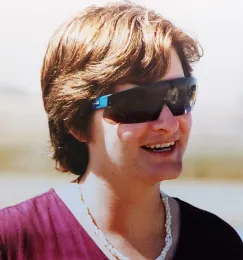
Richard Kim, a doctoral candidate whom she co-advises (with Professor Marissa Baskett, Department of Environmental Science and Policy), describes Lawler as “an amazing researcher and an outstanding role-model as a supervisor; joining her lab was one of the best decisions I've made in life.”
Kim, who holds a bachelor's degree in ecology and evolution from UC Santa Barbara (2010) and a master's degree in biology from San Francisco State University (2017), commented: “Sharon has been advising my projects related to predator-prey relationships between the imperiled giant garter snakes and non-native bullfrogs: (1) experimental feeding trials and (2) mark-recapture surveying in the field. We are currently working to prepare manuscripts that will inform conservation strategies for the snakes by alternative controlling strategies for bullfrogs. Throughout my graduate school experience, Sharon provided not only academic guidance but also sincere advice and support during my personal and health difficulties. She truly is one of the role models I have in life, as a scientist and as a P.I. (principal investigator).
Sharon Lawler grew up in Maplewood, N.J., “where Ultimate Frisbee was invented. “For other Maplewood trivia,” she offered, “see https://sueadler.com/ten-amazing-facts-about-maplewood-new-jersey/.”
And yes, she played Frisbee.
After graduating in 1982 from Lehigh University, Bethlehem, Penn., with a bachelor's degree in biology, Sharon headed to Rutgers University, New Brunswick, N.J., for her master of science degree in ecology (1988) and her doctorate in ecology and evolution (1992).
She completed a two-year term as a postdoctoral researcher at the Imperial College, Silwood Park, Ascot, UK, and a year as a postdoc researcher in biological sciences at the University of Kentucky, Lexington, before joining the UC Davis Department of Entomology in 1995.
Her first UC Davis publication, co-authored with colleagues, dealt with tree frogs: “Thermal Physiology, Phenology, and Distribution of Tree Frogs," published in The American Naturalist in 1988. Her first publication as lead author: “Behavioural Responses to Predators and Predation Risk in Four Species of Larval Anurans." (1989, Animal Behaviour)
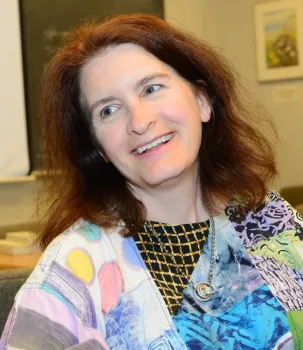
An avid researcher, Lawler is the co-principal investigator (with John Eadie and Daniel Karp of Department of Wildlife, Fish, and Conservation Biology) of a substantial grant, the Integrated Wetland Management Project, to develop reduced-pesticide mosquito control via beneficial predators. The grant, awarded in 2022, has no expiration date.
Over the last five years, her other grants, ranging from $88,000 to $659,000, dealt with
- “Impacts of Storm-Driven Contaminants on Larval Delta Smelt and the Community Scale Adaptive Capacity of Prey Items to Handle Those Stressors.” (Richard Connon, principal investigator)
- “Post Fire Ecology and Habitat Suitability Evaluation for the Proposed Federally Listed Sierra Nevada Yellow-Legged Frog on the Lassen and Plumas National Forests.” USDA: Forest Service (with Sarah Yarnell and Cathy Brown)
- “High-Throughput Biomonitoring of Aquatic Invertebrates.” (Richard Connon, co-principal investigator), California Department of Pesticide Regulation
- “Area-wide Management of Aquatic Weeds in the Sacramento/ San Joaquin River Delta for Sustainable Control in Farming Areas, Critical Wildlife Habitats, Recreational Zones and Water Conveyance Systems Important for California Agriculture and Human Health.” (Patrick Moran, principal investigator)
Lawler's academic activities included chairing the Entomology and Nematology Curriculum Committee from 2017 to 2022; serving as the lead faculty advisor for the department from 2003 to 2022; and chairing a number of academic search committees. She served on the editorial board for the international peer-reviewed Journal of Ecology and Journal of
Ecological Monographs from 2002-2021 and held membership in the Faculty of 1000, Freshwater and Marine Ecology, from 2008 to 2021. Lawler also completed two terms as chair of the Graduate Group in Ecology, and as chair of the Designated Emphasis in the Biology of Vector-Borne Diseases.
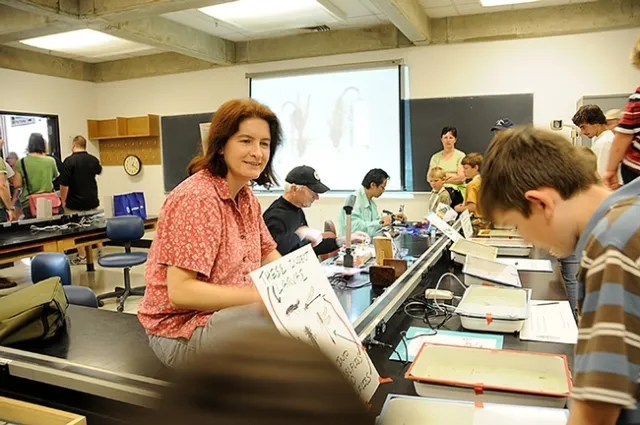
Trivia: Sharon Lawler won the "Best Chocolate Chip Cookie Contest" at the department's 2019 winter holiday party with her recipe, "Dirty Drunk Snowball," which included only three ingredients: 1 box Trader Joe's Mini Dark Chocolate Mint Stars, 1/4 cup dark rum, and 1/4 confectioner's sugar. (See Bug Squad blog)
What are your plans for retirement after 28 years at UC Davis? Travel plans? Research? Teaching? Public service?
“I'm not off the hook for UC Davis yet! I have a couple of great, co-advised graduate students who are completing their dissertations (Rich Kim and Kyle Phillips). I'm also on a research project aimed at improving wetland management to restrict mosquito production and enhance wildlife resources. I'm fortunate to collaborate on this with Professors John Eadie and Danny Karp of the Department of Wildlife, Fish, and Conservation Biology; graduate student John Veon leads our field research. The project is supported by long-time UC Davis supporters Paul and Sandi Bonderson of the lovely Bird Haven Ranch, where the research takes place."
"However, I'm enjoying a lighter schedule that includes morning walks and gardening. I plan to visit with my family more often. I'll also spend more time nagging my representatives and other voters to stay woke. It's better than sleepwalking while The Man stacks the deck against We The People.”
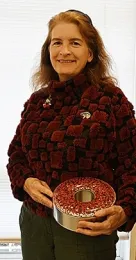
“I have always enjoyed observing insects, but I was a late-comer to formal entomology. My degrees are in biology (B.A.) and ecology and evolution (Ph.D). My Ph.D. advisor, Peter Morin, emphasized learning about aquatic insects as an important part of aquatic food webs. We did a project on how aquatic insects affect amphibian larvae. My familiarity with aquatic insects came in very handy when I was hired as a mosquito biologist at UC Davis, but there was still a steep learning curve. Bob Washino (now professor emeritus and former department chair) and Debbie Dritz (now a vector ecologist with the Sacramento-Yolo Mosquito and Vector Control) were very helpful in advising me about California's mosquito research issues, and Al Grigarick (now professor emeritus) gave me some excellent resources for teaching aquatic entomology. Thanks to them, and to a lot of late nights, I was doing mosquito research and teaching an entomology class within a few months of arriving at Davis. My fascination with insects has increased through time, thanks to our seminar series and the amazing research performed by our students and faculty.”
What will you miss the most?
“I'll miss the great people of our Department and the Phoenix Cluster the most. I felt very lucky to be among so many pleasant, professional, and fun folks. I will also miss daily interactions with students and colleagues in a variety of graduate groups and departments. UC Davis is full of kind, intelligent do-gooders in all sorts of jobs!”
What will you miss the least?
“I won't miss evaluating students, peers, and manuscripts. I prefer to judge silently--or sometimes confidentially, with friends over a beer. I still review the occasional manuscript because I am still publishing, but I'm more selective now.”
What do you consider your greatest accomplishments in the field of entomology? In teaching? Research? Public service?
“Oh, dear, this question is like a 'merit review'... one of the things I surely won't miss!
"In general, my research has been aimed at preserving aquatic biodiversity. In entomology, my lab's research has helped Mosquito and Vector Abatement Districts choose control methods that protect public health in ecologically sound ways. I also collaborated with the Larry Godfrey and Richard Connon labs on projects that revealed non-target effects of various agricultural chemicals on aquatic insects and other taxa." (Note: The late Larry Godfrey, 1956-2017 was a UC Cooperative Extension entomology specialist and Richard Connon, recently retired, served on the School of Veterinary Medicine faculty and is with the UC Davis Coastal and Marine Sciences Institute.)
"Not all of my projects were in entomology. In other work we evaluated whether various invasive species harm native frogs or snakes; invasives included a fungus, bullfrogs, and various fishes. These projects have helped wildlife managers conserve native species. I've also done research on how food web structure affects population dynamics, using protists as a model system.”
Any other comments?
“As an instructor, I enjoyed teaching aquatic entomology all 28 years, especially getting students out to our Natural Reserves to see insects in their habitats. I also loved teaching Community Ecology to graduate students from several graduate groups; we have top-notch students and discussion sessions were rewarding.”
